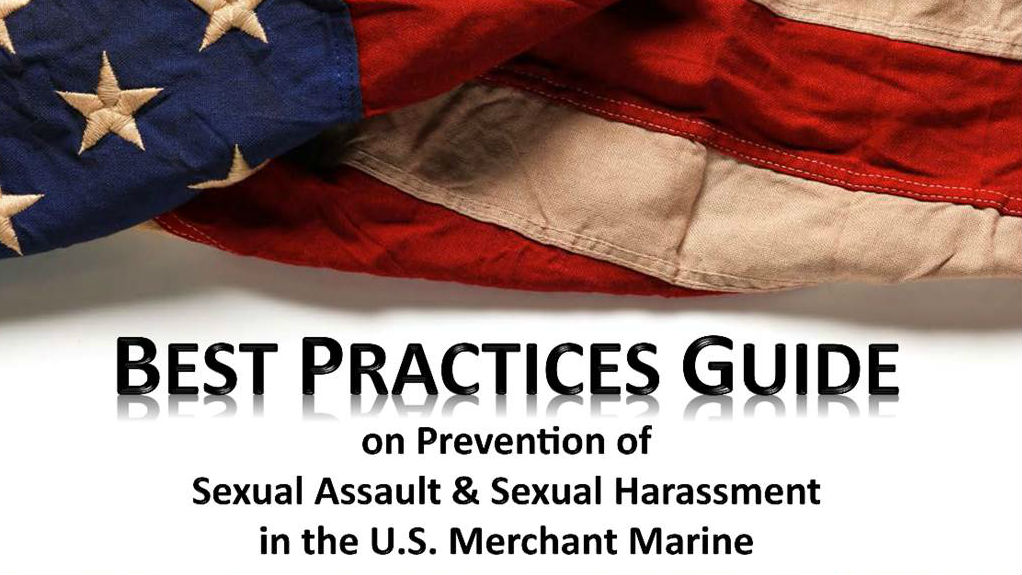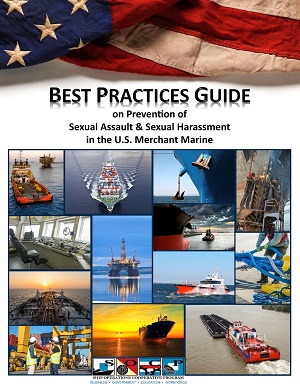Prevention of Sexual Harassment Guide Released

The Ship Operations Cooperative Program (SOCP) has released a best practices guide on the prevention of sexual assault, sexual harassment, retaliation, bystander intervention, bullying, hazing, coercion, stalking and other prohibited behaviors in the U.S. Merchant Marine.
The guide includes guidance for both employees and companies and is designed for use by maritime companies of all sizes. It was developed under a cooperative agreement with the Maritime Administration (MARAD).
 The employee section is designed to provide U.S. merchant mariners and shore-based personnel with guidance on meeting their responsibility to be respectful and to actively participate in a work environment free of sexual harassment. It contains some “dos” and “don'ts” including: Do report all prohibited behaviors – “If You See Something, Say Something!” Do – Treat others with the same respect you expect to receive, and do understand that “No means No.”
The employee section is designed to provide U.S. merchant mariners and shore-based personnel with guidance on meeting their responsibility to be respectful and to actively participate in a work environment free of sexual harassment. It contains some “dos” and “don'ts” including: Do report all prohibited behaviors – “If You See Something, Say Something!” Do – Treat others with the same respect you expect to receive, and do understand that “No means No.”
The guide covers shore leave and notes: “The use of alcohol or drugs never makes a victim at fault for sexual assault or sexual harassment committed against them. The perpetrator’s use of alcohol or drugs does not constitute a valid excuse for any action leading to an incident of sexual assault or sexual harassment.”
The “Bystander Effect”
The guide explains that sexual harassment can involve more than the offender and the victim. It can also involve bystanders; those who witness sexual harassment taking place or hear about it. Bystanders fall into two categories, instigators and active bystanders. Instigators will encourage, join in or passively accept the prohibited behavior by doing nothing. Active bystanders directly intervene by reporting the behavior, defending the victim, redirecting the situation and getting help.
The so-called “bystander effect” occurs when the presence of others discourages an individual from intervening in a situation. U.S. merchant mariners and shore-based personnel have a responsibility to protect one another, states the guide. Recognizing the behaviors of potential offenders, being aware of high-risk situations and being an active bystander are all ways of doing this.
Policies and Procedures
The company section provides six best practices which should be part of every company’s policy on prohibited behaviors in the workplace, whether onshore or at sea. Existing best practices, policies and procedures are emphasized within each section, with examples in the Annexes.
The guide notes two types of sexual harrassment: A hostile work environment is the most common type of sexual harassment and occurs when conduct of a sexual nature is so severe that it creates an intimidating, offensive or abusive workplace or unreasonably interferes with an individual’s performance. Isolated incidents of simple teasing or offhand comments may not by themselves amount to sexual harassment. However, frequent or severe incidents can adversely impact performance and become a hostile work environment.
The other type of sexual harassment is “quid pro quo” or “this for that.” In a quid pro quo situation, someone in authority may promise to grant an employment benefit or reward in exchange for sexual favors or threaten to withhold a benefit or reward because of someone’s rejection of a request for sexual favors.
The guide supports the development of prevention policies and procedures to address these behaviors and their consequences. Without a clear definition, ambiguity can exist, and inconsistencies within policies and procedures can hinder a company’s ability to prevent and respond to incidents.
Spreading the Word
“The U.S. Merchant Marine aggressively promotes a culture where sexual assault, sexual harassment and other prohibited behaviors cannot exist,” says Patricia Finsterbusch, President of SOCP. “We strongly recommend that SOCP members and the maritime industry continue the dialogue and spread the word about the importance of these issues.”
The intended audience for the guide includes professional merchant mariners on vessels of all types covering all U.S. Merchant Marine segments including oceangoing, coastwise, Great Lakes, inland, harbor, towing, offshore industry, cruise, ferries, dredging, research vessels and government-owned vessels. In addition, these industry best practices apply to maritime operating companies, shipowners and operators; shore-based personnel managing or interacting with merchant mariners, contractors and others who work in the industry.
Other segments of the U.S. maritime industry such as vessel marine agents, pilots, marine terminal personnel, longshoremen, personnel working in U.S. ports, shipbuilding and ship repair industry personnel, as well as contractors, subcontractors, and vendors interacting with merchant mariners should all be made aware of these best practices.
The Ship Operations Cooperative Program (SOCP) is a non-profit organization of maritime industry professionals working together to improve the safety, productivity, efficiency, security and environmental performance of U.S. vessel operations.
The guide is available for free here.
